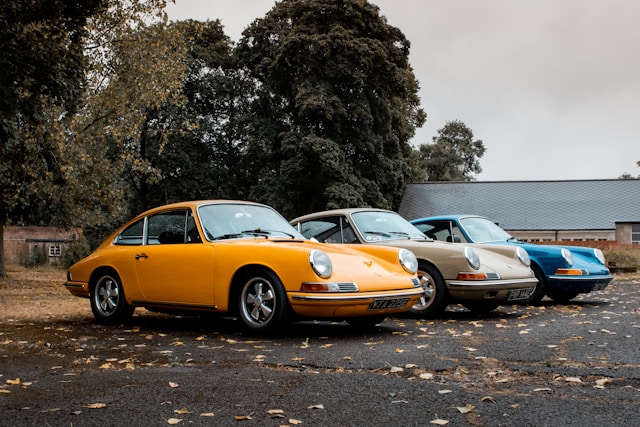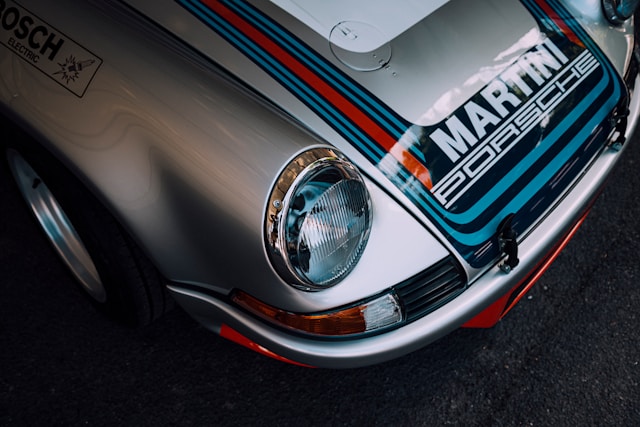Porsche is a symbol of excellence and precision in the automotive industry. Its marketing strategy is a masterclass in brand building, blending heritage, innovation, and a keen understanding of its audience. This post outlines the elements that make Porsche’s marketing strategy a benchmark for success, exploring campaigns and tactics that resonate with marketing professionals.
A Legacy of Excellence
Porsche’s story began in 1948 with the creation of the Porsche 356. The brand’s foundation is built on engineering excellence and a passion for motorsports. This rich history is at the heart of Porsche’s marketing strategy. They leverage their legacy to create a powerful brand narrative that speaks to the timeless appeal of their cars.
Heritage and Storytelling
Porsche consistently uses its heritage in marketing campaigns. The “Timeless Machine” campaign is a prime example. Celebrating the 70th anniversary of the Porsche 911, this campaign highlighted the evolution of the model while emphasizing its timeless design and performance. The campaign included a series of videos and social media posts featuring the 911 in various historical contexts. This approach not only celebrated the car’s legacy but also connected with both long-time fans and new enthusiasts.

Precision in Positioning
Porsche positions itself as a premium brand with a focus on performance and luxury. This positioning is clear in all aspects of its marketing. They do not aim to appeal to everyone; instead, they target a specific audience that values quality, performance, and exclusivity.
Premium Branding
Everything Porsche does reinforces its premium brand image. Their advertisements often focus on the craftsmanship, engineering, and performance of their cars. For example, the “Dreamers. On.” campaign celebrated innovation and engineering excellence. It featured real-life innovators and dreamers, aligning Porsche’s brand with creativity and forward-thinking.
Innovation and Technology
While Porsche leans heavily on its history, it is also a brand that looks to the future. Innovation and cutting-edge technology are key pillars of their marketing strategy. The introduction of the Porsche Taycan, their first all-electric sports car, is a testament to this commitment.

Embracing Electric
The marketing campaign for the Taycan was a significant departure from traditional Porsche marketing. It was futuristic, highlighting the car’s advanced technology and performance. The “Soul, Electrified” campaign aimed to reassure customers that even as Porsche evolves, it remains true to its performance roots. The campaign used sleek, modern visuals and focused on the seamless integration of electric technology into the Porsche driving experience.
Customer Experience
Porsche understands that buying a car is about more than just the product; it’s about the experience. They focus on creating exceptional customer experiences both online and offline.
Personalized Experiences
Porsche’s digital presence is designed to be as immersive and personalized as possible. Their website offers a comprehensive car configurator, allowing customers to build their dream car down to the smallest detail. This level of personalization extends to their dealerships, where customers can enjoy tailored experiences, from personalized test drives to custom car fittings.
Motorsport Connection
Porsche’s roots in motorsport are a significant part of its brand identity. They consistently leverage their success in racing to enhance their brand image.
Racing Heritage
The “Enduring Passion” campaign is a perfect example of how Porsche uses its racing heritage in marketing. Celebrating their 19th victory at Le Mans, the campaign highlighted the engineering prowess and relentless pursuit of perfection that define Porsche. This connection to motorsport reinforces the brand’s commitment to performance and excellence.

Strategic Partnerships
Porsche also uses strategic partnerships to enhance its brand image and reach new audiences. Collaborations with other premium brands and sponsorships of high-profile events help Porsche maintain its premium positioning.
Exclusive Collaborations
One notable partnership is with TAG Heuer, a brand synonymous with precision and luxury. The collaboration resulted in a special edition TAG Heuer Carrera Porsche Chronograph, combining the best of both brands. Such partnerships reinforce Porsche’s premium image and appeal to their target audience’s sense of exclusivity and refinement.
Engaging Content
Porsche’s content marketing strategy is robust, leveraging various platforms to engage with their audience. From social media to branded content, Porsche uses storytelling to connect with customers on a deeper level.
Digital Storytelling
Porsche’s use of digital storytelling is evident in their social media strategy. They create engaging content that showcases their cars in dynamic and aspirational settings. Instagram, for example, is filled with high-quality images and videos of Porsche cars, often featuring user-generated content that highlights the passionate Porsche community.
Social Media Strategy
Porsche’s social media strategy is a key component of its marketing. They use platforms like Instagram, Facebook, and YouTube to share stories, engage with fans, and showcase their cars. Each platform is used strategically to reach different segments of their audience.
Instagram and Visual Appeal
On Instagram, Porsche leverages the platform’s visual nature to showcase the beauty and design of their cars. Their posts often feature stunning photography and videos, capturing the essence of the Porsche brand. They also engage with their followers by reposting user-generated content, which helps build a community around the brand.
Event Marketing
Porsche uses events to create memorable experiences for their customers. These events range from exclusive car launches to driving experiences that allow customers to test the performance of Porsche cars in a controlled environment.
Porsche Experience Centers
Porsche Experience Centers (PECs) around the world offer customers and fans the opportunity to experience Porsche cars firsthand. These centers feature state-of-the-art tracks where visitors can test drive various models, attend driving courses, and even learn about the history and heritage of Porsche. The PECs are a key part of Porsche’s strategy to create immersive and memorable brand experiences.
Sustainability and Corporate Responsibility
In recent years, Porsche has also focused on sustainability and corporate responsibility. This focus is not just about meeting regulatory requirements but also about aligning with the values of their customers.
Sustainable Initiatives
The launch of the Taycan marked a significant step in Porsche’s sustainability journey. Porsche has committed to making their factories carbon-neutral and is investing heavily in sustainable technologies. Their marketing campaigns around these initiatives emphasize that Porsche is a brand that cares about the future, aligning with the values of a growing number of consumers who prioritize sustainability.
Learning from Porsche’s Marketing Strategy
Porsche’s marketing strategy is a blend of heritage, precision, innovation, and customer focus. By leveraging their rich history, embracing cutting-edge technology, and creating exceptional customer experiences, Porsche has built a brand that is both aspirational and accessible. Their success lies in their ability to stay true to their core values while continuously evolving to meet the needs of their customers.
For marketing professionals, Porsche’s strategy offers valuable lessons in brand building, customer engagement, and innovation. By studying their approach, one can gain insights into how to create a powerful brand narrative, position a product effectively, and build lasting relationships with customers. Porsche’s marketing is a testament to the power of combining tradition with innovation, creating a brand that stands the test of time.
Here are five key lessons marketers can learn from Porsche’s approach to building and sustaining a premium brand.
1. Leverage Heritage and Storytelling
Porsche has a rich history that it skillfully incorporates into its marketing campaigns. By celebrating its legacy, Porsche creates a deep emotional connection with both longtime fans and new customers. The “Timeless Machine” campaign, which marked the 70th anniversary of the Porsche 911, is a prime example. This campaign highlighted the car’s evolution while maintaining its core identity, showcasing how honoring history can reinforce brand values and appeal.
Lesson: Use your brand’s history and heritage to create compelling stories that resonate emotionally with your audience. This approach builds a strong brand identity and fosters loyalty.
2. Focus on Premium Positioning
Porsche consistently maintains its positioning as a premium brand. They focus on quality, performance, and luxury, targeting a specific audience that values these attributes. Their marketing materials, from advertisements to social media content, reinforce this high-end image. The “Dreamers. On.” campaign, which linked the brand with innovation and creativity, exemplifies how to effectively position a product as premium.
Lesson: Clearly define your brand’s positioning and consistently communicate it across all marketing channels. This helps in attracting and retaining the right audience who values what your brand stands for.
3. Embrace Innovation While Honoring Tradition
Porsche strikes a balance between honoring its storied past and embracing future innovations. The launch of the all-electric Porsche Taycan with the “Soul, Electrified” campaign demonstrated Porsche’s ability to innovate while staying true to its brand essence. This campaign reassured customers that Porsche’s commitment to performance and driving pleasure remains unchanged, even as it transitions to new technologies.
Lesson: Innovate and evolve your products while ensuring they align with your brand’s core values. This balance helps in attracting new customers without alienating existing ones.
4. Create Exceptional Customer Experiences
Porsche places a strong emphasis on delivering exceptional customer experiences, both online and offline. Their personalized car configurator and immersive Porsche Experience Centers are testament to this commitment. These initiatives provide customers with unique, tailored experiences that enhance brand loyalty and satisfaction.
Lesson: Focus on creating personalized and memorable experiences for your customers. These experiences can significantly boost customer satisfaction and foster long-term loyalty.
5. Utilize Strategic Partnerships
Porsche effectively uses strategic partnerships to enhance its brand image and reach new audiences. Collaborations with other premium brands, such as the partnership with TAG Heuer, reinforce Porsche’s luxury positioning and appeal to a shared target audience.
Lesson: Partner with brands that complement your own to create mutually beneficial relationships. These collaborations can expand your reach, enhance your brand image, and provide added value to your customers.

